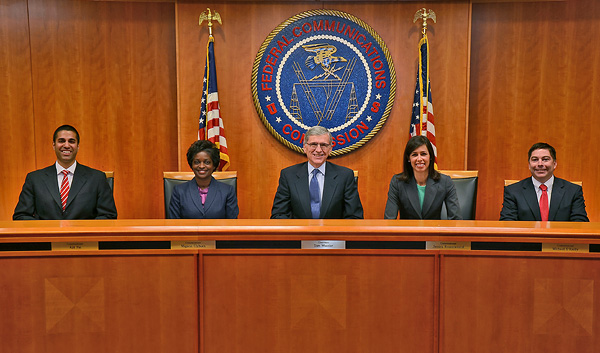FCC Reviewing Proposed Charter, Bright House, Time Warner Merger
After the Open Internet legislation passed a few months ago, Comcast backed down from its plans to merge with Time Warner. Since then, several rumors have circulated that other companies were considering merging with Time Warner, but nothing official was announced until now. The FCC announced today the members of an inter-bureau steering committee that will review a proposed merger between Charter Communications Inc., Time Warner Cable Inc., and Bright House Networks LLC.
The newly formed steering committee will be chaired by General Counsel Jonathan Sallet. Joining Sallet will be Media Bureau Chief Bill Lake, International Bureau Chief Mindel De La Torre, Wireline Competition Bureau Chief Matthew DelNero, and Wireless Telecommunications Bureau Chief Roger Sherman.
Currently, Time Warner Cable is the fourth largest multichannel video programming distributor (MVPD), while Charter is the seventh, and Bright House Networks is the tenth. If the merger is approved, the new conglomerate company would be the third largest MVPD in the U.S. with 17.3 million customers. In addition, the joined company would represent the second largest broadband Internet service provider, with 19.4 million broadband subscribers, stretching across nearly 40 states.
Although the joined forces of these ISPs wouldn't be enough to surpass Comcast as the nation's largest broadband service provider, it would be a significant gain on Comcast's current market leadership. It could potentially result in some measure of competition, as Comcast and this new conglomerate company would face off to be the largest ISP in America.
We likely won't hear if the merger was approved for some time, however. The Comcast/Time Warner Cable merger was originally proposed back on February 13, 2014, wasn't approved until October, and ultimately collapsed April 24, 2015. The new Charter/Time Warner/Bright House merger was submitted June 25, 2015, and though it is already under review, if approved, the companies will likely not complete the merger for another year.
Follow Michael Justin Allen Sexton @LordLao74. Follow us @tomshardware, on Facebook and on Google+.
Get Tom's Hardware's best news and in-depth reviews, straight to your inbox.
-
velocityg4 I can't really see where this would provide competition. I've never known anyplace where you can choose between two cable companies. You're just stuck with a government sanctioned monopoly. Which can then nail you on data usage and expensive TV packages. The only time there is really any competition is if you are lucky enough to have a competing fiber optic provider (except U-Verse they are fake fiber optic as they don't run it to your house). Then magically the cable company can offer greater bandwidth and no caps for the same price.Reply
While I don't like government intervention. If they are being given defacto monopolies. They should have there pricing regulated to a 5% profit margin, user selectable programming packages and be tasked with constantly improving their infrastructure for more data bandwidth and new technologies. Technologies such as adding 4K, dropping SD and transition all SD channels to HD.
For user selectable channels have those same 40+, 100+, &c deals but you choose which channels those are. -
MasterMace The antitrust is still there, whether it's a 3 companies (Comcast, Verizon, Chartwarnerhouse) or 10.Reply -
alidan if there is a god this wont happen... i like charter but if they merge with time warner it will probably kill my internet horrible.Reply -
stevenrix American institutions are only managed by political entities (US supreme court, and so on and so on). When the gov will transition to a new President, all those anti-trust measures will be gone with the wind.Reply
-
knowom Why would this be any better than Time Warner/Comcast merger wouldn't it be just as bad for the same reasons.Reply -
falchard Really doesn't matter. The companies only have competitors in a couple markets anyways, and not with Comcast. Once merged, they will probably end up with how Time Warner is now. A hodge podge of different systems bandaged together into an unmanageable mess. I remember working for Time Warner and the experience is very different than Cox. You can tell that different regions used to be different cable providers that merged. The equipment is different, and how you work with equipment has you wasting a lot of time dealing with the different bandages that made it the same network. At least 30 minutes every job is wasted because of this.Reply -
jasonelmore The only way i'd approve the merger is if they agree'd to compete with comcast in the same areas, and not just in a dozen or so cities.Reply
getting cable companies to lay cable to new areas is like asking congress to do the right thing. -
dark_lord69 "It could potentially result in some measure of competition"Reply
How?
Have you EVER been able to pick your cable company? Infact I've never even heard of such a thing... Because it seems to me, they all seem to have local monopolies AND the government doesn't do anything about it... -
falchard In San Diego, you can choose between Cox, Time Warner and New Horizon in a few areas. However, its not much of a choice since Cox provides a far superior service for less. Also its not the companies enforcing these monopolies. Its the municipal governments. They simply deny new entrants due to the disturbance new construction would cause, or price them out of profitability to use pole space.Reply
